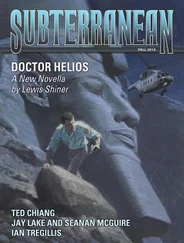Some humans theorize that intelligent species go extinct before they can expand into outer space. If they’re correct, then the hush of the night sky is the silence of a graveyard.
Hundreds of years ago, my kind was so plentiful that the Río Abajo Forest resounded with our voices. Now we’re almost gone. Soon this rain forest may be as silent as the rest of the universe.
· · ·
There was an African gray parrot named Alex. He was famous for his cognitive abilities. Famous among humans, that is.
A human researcher named Irene Pepperberg spent thirty years studying Alex. She found that not only did Alex know the words for shapes and colors, he actually understood the concepts of shape and color.
Many scientists were skeptical that a bird could grasp abstract concepts. Humans like to think they’re unique. But eventually Pepperberg convinced them that Alex wasn’t just repeating words, that he understood what he was saying.
Out of all my cousins, Alex was the one who came closest to being taken seriously as a communication partner by humans.
Alex died suddenly, when he was still relatively young. The evening before he died, Alex said to Pepperberg, “You be good. I love you.”
If humans are looking for a connection with a nonhuman intelligence, what more can they ask for than that?
· · ·
Every parrot has a unique call that it uses to identify itself; biologists refer to this as the parrot’s “contact call.”
In 1974, astronomers used Arecibo to broadcast a message into outer space intended to demonstrate human intelligence. That was humanity’s contact call.
In the wild, parrots address each other by name. One bird imitates another’s contact call to get the other bird’s attention.
If humans ever detect the Arecibo message being sent back to Earth, they will know someone is trying to get their attention.
· · ·
Parrots are vocal learners: we can learn to make new sounds after we’ve heard them. It’s an ability that few animals possess. A dog may understand dozens of commands, but it will never do anything but bark.
Humans are vocal learners, too. We have that in common. So humans and parrots share a special relationship with sound. We don’t simply cry out. We pronounce. We enunciate.
Perhaps that’s why humans built Arecibo the way they did. A receiver doesn’t have to be a transmitter, but Arecibo is both. It’s an ear for listening, and a mouth for speaking.
· · ·
Humans have lived alongside parrots for thousands of years, and only recently have they considered the possibility that we might be intelligent.
I suppose I can’t blame them. We parrots used to think humans weren’t very bright. It’s hard to make sense of behavior that’s so different from your own.
But parrots are more similar to humans than any extraterrestrial species will be, and humans can observe us up close; they can look us in the eye. How do they expect to recognize an alien intelligence if all they can do is eavesdrop from a hundred light-years away?
· · ·
It’s no coincidence that “aspiration” means both hope and the act of breathing.
When we speak, we use the breath in our lungs to give our thoughts a physical form. The sounds we make are simultaneously our intentions and our life force.
I speak, therefore I am. Vocal learners, like parrots and humans, are perhaps the only ones who fully comprehend the truth of this.
· · ·
There’s a pleasure that comes with shaping sounds with your mouth. It’s so primal and visceral that, throughout their history, humans have considered the activity a pathway to the divine.
Pythagorean mystics believed that vowels represented the music of the spheres, and chanted to draw power from them.
Pentecostal Christians believe that when they speak in tongues, they’re speaking the language used by angels in heaven.
Brahman Hindus believe that by reciting mantras, they are strengthening the building blocks of reality.
Only a species of vocal learners would ascribe such importance to sound in their mythologies. We parrots can appreciate that.
· · ·
According to Hindu mythology, the universe was created with a sound: “om.” It is a syllable that contains within it everything that ever was and everything that will be.
When the Arecibo telescope is pointed at the space between stars, it hears a faint hum.
Astronomers call that the cosmic microwave background. It’s the residual radiation of the Big Bang, the explosion that created the universe fourteen billion years ago.
But you can also think of it as a barely audible reverberation of that original “om.” That syllable was so resonant that the night sky will keep vibrating for as long as the universe exists.
When Arecibo is not listening to anything else, it hears the voice of creation.
· · ·
We Puerto Rican parrots have our own myths. They’re simpler than human mythology, but I think humans would take pleasure from them.
Alas, our myths are being lost as my species dies out. I doubt the humans will have deciphered our language before we’re gone.
So the extinction of my species doesn’t just mean the loss of a group of birds. It’s also the disappearance of our language, our rituals, our traditions. It’s the silencing of our voice.
· · ·
Human activity has brought my kind to the brink of extinction, but I don’t blame them for it. They didn’t do it maliciously. They just weren’t paying attention.
And humans create such beautiful myths; what imaginations they have. Perhaps that’s why their aspirations are so immense. Look at Arecibo. Any species who can build such a thing must have greatness within them.
My species probably won’t be here for much longer; it’s likely that we’ll die before our time and join the Great Silence. But before we go, we are sending a message to humanity. We just hope the telescope at Arecibo will enable them to hear it.
The message is this:
You be good. I love you.
Omphalos

Lord, I place myself in your presence, and ask you to shine your light into my heart as I look back upon this day, so that I may see more clearly your grace in everything that has happened.
Right now I’m content and grateful for such a satisfying day, but it didn’t begin auspiciously. My mood was poor when my aeroplane arrived this morning. As I was looking around the terminal for the cabstand, a man thought I was lost and tried to come to my rescue. He told me Chicagou was no place for a woman traveling alone, and I replied that I had managed well enough in Mongolia and that I doubted Chicagou could be any worse. Forgive me, Lord, for being sharp to a man who sought only to assist me. I ask for your help in being patient with those who believe women helpless.
I admit, I wasn’t exactly looking forward to stopping here. It’s been so long since I wrote the book that my attention has moved on to other things, and in the last month I’ve been entirely focused on preparing for the Arisona dig. After Dr. Janssen’s electric mailgram, all I could think about was those spearpoints and what they might tell us. When my publisher arranged for me to give a public lecture here, I thought he was just taking advantage of my travel plans, getting me to promote the book without paying for the aeroplane ticket, and it felt more like a delay than anything else.
My mood improved after I got to the hotel and was met by an assistant from the theater where I was to speak. At first, when she told me how much she was looking forward to my lecture, I thought she was simply being polite, but then she spoke in some detail about how my book had given her a renewed appreciation for the work that scientists did, and I realized her enthusiasm was unfeigned. Hearing such a response from a reader was gratifying, but more important, it was a reminder that education is just as important a part of an archaeologist’s job as fieldwork. Thank you, Lord, for gently showing me how self-absorbed I was to regard the public lecture as a chore.
Читать дальше










